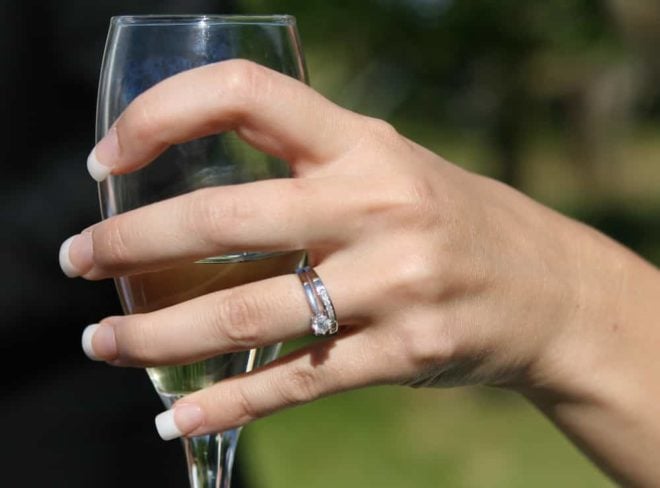1 – Madame or Mademoiselle = Madame In Official Writing
There has been plenty of talks about Mademoiselle versus Madame lately, but mostly on how to address a woman when writing a letter, especially when you have to fill in an official form, or for a subscription or something like that.
If the fact that you are a man or a woman can be relevant to the said subscription, your marital status – married or single – often isn’t: and is seen by some as an invasion of privacy.
Actually, France Prime Minister Mr Fillon banned the use of Mademoiselle in 2012 from legal documents.
Therefore, administrative forms and official documents no longer use Mademoiselle in writing.
By the way, the abbreviation for “Madame” is “Mme”. The abbreviation for “Mademoiselle” is “Mlle”. You don’t have to use the abbreviation: read more about this in my article on how to write French letters.
2 – Madame or Mademoiselle = Very Much a Question When Speaking
It is, however, considered much more polite in French to follow a “bonjour / bonsoir / merci” by “monsieur, madame or mademoiselle” when you speak.
It’s a bit old school, but still VERY encouraged (although not adding a title is not impolite per se).
So the Madame versus Mademoiselle dilemma remains intact when speaking… and that’s what I’m going to explain now.
3 – The Correct Pronunciation of Mademoiselle and Madame in French
First, please let me clarify the French pronunciation of both words, since I hear many mistakes on them.
- Do not say the first “e” in mademoiselle.
It’s [mad mwa zel] in French.
You may even hear an even more glided pronunciation [mamzel] but it’s a bit extreme and not very sophisticated at all. I suggest you stick with [madmwazel]. - For Madame, it’s kind of the same as in English except that the 2 A have the same strength: we don’t make a syllable stronger over the other one, and then we end on a strong M sound. [madam].
By the way, the plural forms are “mesdemoiselles” and “mesdames”.

In-depth audiobook covering the foundations as well as the difficulties of today’s French pronunciation
Now let’s see how we use Madame versus Mademoiselle when we speak.
4 – Very Young Girl = Always Mademoiselle
In France, no one would dream of calling a twelve years old “madame”. It would just sound really out of place.
You may check “madame” as the “legal” status on an official form, but that’s not how you’d address a young girl.
So please understand the difference between official mail / status and the way we speak. When we speak in French, we still very much use Mademoiselle for young girls and young ladies.
The other clear answer depends on the marital status of the woman.
5 – Married = Madame / Not Married = Mademoiselle
The basic rule is simple. If the woman is married, you should say “madame” (even if she is a widow: once married, always “madame”.)
If she isn’t, you should say “mademoiselle”.
6 – What If You Don’t Know the Woman’s Marital Status?
But what if you don’t know?
Look at her finger and see if she wears a ring…
And if you cannot see, well, then this is what I, personally, do:
- If the woman looks under, say 25, especially if she looks young, I use “mademoiselle”.
- Over 25 or so, I, personally, use “madame”.
But don’t worry, half of the time I also wonder whether I got it right!
And, despite all this fuss and this long article, it’s actually no big deal really! Most women would not even think twice about it!
7 – Cultural Tips and Controversy About Madame Versus Mademoiselle
When madame is used too soon
Some younger French women may be surprised by the use of “madame” when speaking French when they don’t expect it… it makes them feel old: The reaction is “how old do you think I am if you call me madame ?”.
Sometimes madame, sometimes mademoiselle
When we are in our twenties, we’re quite accustom to hearing people address us as sometimes “mademoiselle”, sometimes “madame”… The confusion may last in your thirties…
Then one day you become “madame” forever – LOL – just like in the US when waiters stop asking for your ID when serving a drink. That’s it. You’re obviously old!
It’s true that this little word is quite powerful since it’s undoubtedly linked to the perception people have of you: the age they think you are… but it’s not only a question of age…
Mademoiselle forever
Although it’s no longer very common, some spinsters may insist on the use of “mademoiselle”. This is typical for an older school teacher who has devoted her entire life to her students for example, and wants to make a point she scarified her own personal life for her passion.
What are they trying to prove? That they’ve lived a life without man. So, Catholic morals mixing with women rights, in some cases even gay rights. Powerful stuff!
And bottom line, that what it is all about: “une demoiselle” has not been with a man. So… that applies to young girls of course, and to women of age who… well if you follow the Catholic morals, were not married and therefore were never intimate with a man.
Such a sexist way of looking at women
Now let’s try to use that filter.
If we follow the logic above, then when looking at a woman, one should wonder “could she have been sexually active….”
Yes = madame,
No = mademoiselle.
Charming.
As I said, some spinsters are very proud of being called “Mademoiselle”, whereas for other woman, it can be hurtful. Either way, it’s super sexist. Yet deeply ingrained in the French culture.
The first time I was called madame
The first time I was called “madame”, I was riding the Paris subway and I was fourteen… It came to me as a shock!
Granted, the boy who called me “madame” was probably ten himself, and I may have looked like “a woman” to him…
So shocked, flattered, embarrassed… All this because of a title of politeness!
Using madame or mademoiselle to flirt
Now, if you are a man, and say “bonjour mademoiselle” to a 45-year-old, you could sound flirtatious…
However, there is a silver lining: if you did say “bonjour madame” and the said 45-year-old woman answered with a big smile: “non, mademoiselle”, then, she is flirting with you!
You will find more tips such as this one in my audio lesson about Politeness and Greetings.
You may also be interested in this article: why French women don’t date – the French dating system explained.










Comments